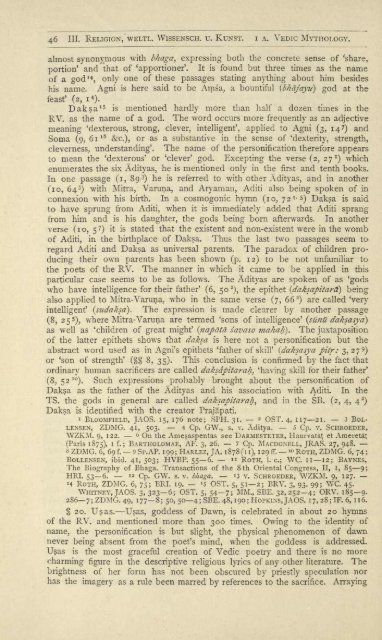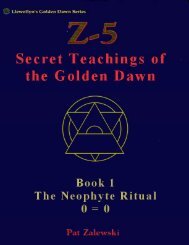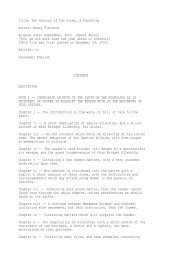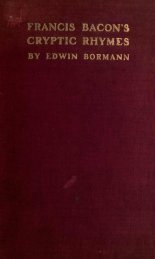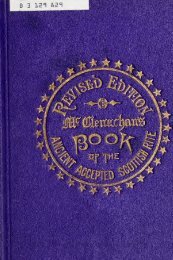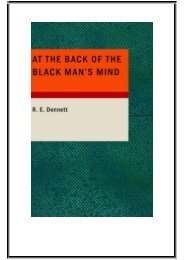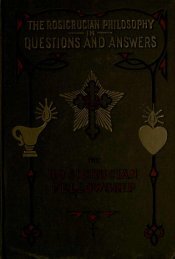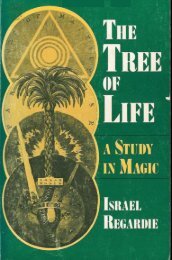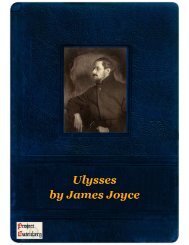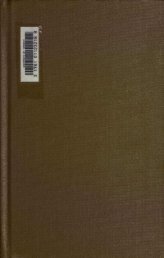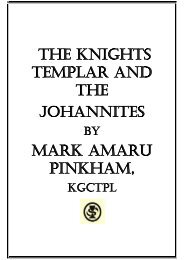download PDF version: 25.9MB - Global Grey
download PDF version: 25.9MB - Global Grey
download PDF version: 25.9MB - Global Grey
You also want an ePaper? Increase the reach of your titles
YUMPU automatically turns print PDFs into web optimized ePapers that Google loves.
46 III. RELIGION, WELTL. WISSENSCH. u. KUNST. i A. VEDIC MYTHOLOGY.<br />
almost synonymous with bhaga, expressing both the concrete sense of share,<br />
portion* and that of apportioned. It is found but three times as the name<br />
of a god 14 , only one of these passages stating anything about him besides<br />
his name. Agni is here said to be Amsa,, a bountiful (bhdjayii) god at the<br />
feast (2, 1 4).<br />
Daksa 15 is mentioned hardly more than half a dozen times in the<br />
RV. as the name of a god. The word occurs more frequently as an adjective<br />
meaning dexterous, strong, clever, intelligent , applied to Agni (3, 147) and<br />
Soma (9, 6i l8<br />
&c.), or as a substantive in the sense of dexterity, strength,<br />
cleverness, understanding . The name of the personification therefore appears<br />
to mean the dexterous or clever god. Excepting the verse (2, 27*) which<br />
enumerates the six Adityas, he is mentioned only in the first and tenth books.<br />
In one passage (i, 89 3 ) he is referred to with other Adityas, and in another<br />
(10, 64 5<br />
) with Mitra, Varuna, and Aryaman, Aditi also being spoken of in<br />
connexion with his birth. In a cosmogonic hymn (10, 72^5) Daksa is said<br />
to have sprung from Aditi, when it is immediately added that Aditi sprang<br />
from him and is his daughter, the gods being born afterwards. In another<br />
it is stated that the existent and non-existent were in the womb<br />
verse (10, 5?)<br />
of Aditi, in the birthplace of Daksa. Thus the last two passages seem to<br />
regard Aditi and Daksa as universal parents. The paradox of children pro<br />
ducing their own parents has been shown (p. 12) to be not unfamiliar to<br />
the poets of the RV. The manner in which it came to be applied in this<br />
particular case seems to be as follows. The Adityas are spoken of as gods<br />
who have intelligence for their father (6, 5o 2<br />
), the epithet (daksapitard) being<br />
also applied to Mitra-Varuna, who in the same verse (7, 66 2<br />
) are called very<br />
intelligent (sudaksa). The expression is made clearer by another passage<br />
(8, 255), where Mitra-Varuna are termed sons of intelligence (sunu daksasya)<br />
as well as children of great might (napata savaso mahaJi). The juxtaposition<br />
of the latter epithets shows that daksa is here not a personification but the<br />
abstract word used as in Agni s epithets father of skill (daksasya pitr: 3, 2 7 9)<br />
or son of strength ( 8, 35). This conclusion is confirmed by the fact that<br />
ordinary human sacrificers are called daksdpitarah, having skill for their father"<br />
(8, 52 10<br />
).<br />
Daksa as<br />
Such expressions probably brought about the personification of<br />
the father of the Adityas and his association with Aditi. In the<br />
2<br />
TS. the gods in general are called daksapitarah, and in the SB. (2, 4, 4 )<br />
Daksa is identified with the creator Prajapati.<br />
i BLOOMFIELD, JAOS. 15, 176 note; vSPH. 2<br />
31. OST. 4, 117 21. 3 BOL-<br />
LENSEN, ZDMG. 41, 503. 4 Cp. GW., s. v. - - 5 Aditya. Cp. v. SCHROEDER,<br />
WZKM. 9, 122. & On the Amesaspentas see DARMESTETER, Haurvatat et Ameretat<br />
(Paris 1875), i f. ; BARTHOLOMAE, AF. 3, 26. 7 Cp. MACDONELL, JRAS. 27, 948.<br />
* ZDMG. 6, 69 f. 9 Sp.AP. 199; HARLEZ, JA. 1878(1 1), 129 ff. "ROTH, ZDMG. 6, 74;<br />
" BOLLENSEN, ibid. 41, 503; HVBP. 556. ROTH, 1. c.; WC. 11 12; BAYNES,<br />
The Biography of Bhaga. Transactions of the 8th Oriental Congress, II, I, 85 9;<br />
HRI. 536. - - 12 Cp. GW. s. v. bhaga. 13 v. SCHROEDER, WZKM. 9, 127.<br />
M ROTH, ZDMG. 6, 75; BRI. 19.<br />
J<br />
5 OST. 5, 512; BRV. 3, 93. 99; W7 C. 45.<br />
WHITNEY, JAOS. 3, 3236; OST. 5, 547; MM., SBE. 32, 252 4; ORV. 1859.<br />
286 7; ZDMG. 49, 1778; 50, 50 4; SBE. 48, 1 90; HOPKINS, JAOS. 17, 28; IF. 6, n 6.<br />
S 20. Us as. Usas, goddess of Dawn, is celebrated in about 20 hymns<br />
of the RV. and mentioned more than 300 times. Owing to the identity of<br />
of dawn<br />
name, the personification is but slight, the physical phenomenon<br />
never being absent from the poet s mind, when the goddess is addressed.<br />
Usas is the most graceful creation of Vedic poetry and there is no more<br />
charming figure in the descriptive religious lyrics of any other literature. The<br />
brightness of her form has not been obscured by priestly speculation nor<br />
has the imagery as a rule been marred by references to the sacrifice. Arraying


